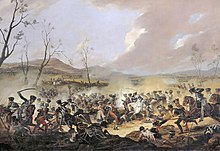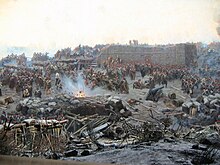Henry Hardinge, 1st Viscount Hardinge
[2] Hardinge entered the British Army on 23 July 1799 as an ensign in the Queen's Rangers,[3] a corps then stationed in Upper Canada.
[4] He was promoted to major on 13 April 1809[8] and appointed deputy-quartermaster-general in the Portuguese army and was present at many of the battles of the Peninsular War.
[4] Promoted to lieutenant-colonel in 1811, he saved the day for the British at Battle of Albuera on 16 May 1811 by taking responsibility at a critical moment and strongly urging General Cole's division to advance.
[8] When war broke out again in 1815 after Napoleon's escape from Elba, Hardinge returned to active service as a brigadier.
[16] In July 1830 he exchanged portfolios with Lord Francis Leveson-Gower, becoming Chief Secretary for Ireland, but relinquished the post in November following the collapse of the Wellington–Peel ministry.
He resigned his seat at St Germans in December and was elected for Newport, another Tory pocket borough, a week later.
[26] Recognising an annuity of £5,000 being paid by the East India Company, Parliament provided that Viscount Hardinge should continue to receive his full salary as Governor General.
[28] Hardinge returned to England in 1848, and became Master-General of the Ordnance on 5 March 1852;[29] he succeeded the Duke of Wellington as commander-in-chief of the British Army on 28 September 1852.
[30] While in this position he had responsibility for the direction of the Crimean War, which he endeavoured to conduct on Wellington's principles — a system not altogether suited to the changed mode of warfare.
[4] As Hardinge was delivering the report of the commission to Queen Victoria and Prince Albert, he collapsed with a stroke.
[35] Hardinge resigned his office of commander-in-chief in July 1856, owing to failing health, and died on 24 September 1856 at South Park near Tunbridge Wells.




